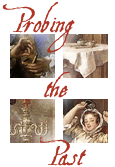Probate records provide valuable information about the lifestyles of people during the colonial and early national periods. Such listings of possessions, from a time when household goods were not widely mass-produced, illuminate a family’s routines, rituals, and social relations, as well as a region’s economy and connection to larger markets. They also shed light on attitudes and policies toward slavery. For famous people, these records enrich our knowledge and understanding of their daily lives and values. For ordinary people, they offer a rare glimpse into their lived experience. These records also provide an opportunity to engage in comparative studies with other eras and to analyze how culture changes over time.
Researchers at Gunston Hall Plantation, the colonial home of George Mason (1725-1792), collected 325 probate inventories from the Chesapeake region of Maryland and Virginia for the period of 1740 to 1810. These inventories were transcribed and the household items entered into a searchable database (view this originial database online or download it (requires Microsoft Access 2000 or later)) to provide insight into the household furnishings that might have been at Gunston Hall during Mason's lifetime. All probate inventories that met designated markers, namely the amount of food service items, including forks, necessary to serve a dinner to 10 persons, were included. The presence of forks indicated a more modern inventory, and the equipage reflected sufficient wealth, while proclaiming an individual's knowledge of the genteel manners and correct behavior essential to the proper execution of the complex social ritual of dining. For an explanation of the scholarly background on this decision, see Barbara Carson, Ambitious Appetites: Dining, Behavior, and Patterns of Consumption in Federal Washington (Washington, D.C.: The American Institute of Architects Press, 1990). In addition, all probate inventories recorded room-by-room, irrelevant of the amount of food service items, were included, as well as other inventories that presented substantial information about such items as clothing, books, furniture, and/or household items.
Several inventories (first collected from the probate records by Carlyle House Historic Park, Alexandria, Virginia, and the Architectural Research Department at the Colonial Williamsburg Foundation) formed the base of the study. Next, microfilms of court records, between the years 1740 and 1810, were carefully analyzed. The collection represents approximately five percent of the inventories recorded in Fairfax, Prince William, and Stafford counties in Virginia and Charles and Prince George's counties in Maryland. Scattered inventories for the cities of Norfolk and Fredericksburg and the counties of James City, Elizabeth City, Isle of Wight, Lancaster, King George, Northumberland, Surrey, Richmond, Frederick, Charles City, Spotsylvania, Middlesex, Westmoreland, and York in Virginia are included. Anne Arundel County, including the City of Annapolis, in Maryland is also part of the collection. Most of the inventories were from the wealthiest estates in Virginia and Maryland. For additional details about criteria used to select inventories, please refer to the Gunston Hall Plantation Room Use Study.
About the Project
Probing the Past provides a searchable version of information contained in the transcriptions of all 325 probate inventories. Users may browse by time period or city/county, or search the database to find records that meet specific criteria, and then view the original written text and a transcript of the inventories.
All collected inventories were transcribed in their entirety. Where words in the original are illegible or questionable, they have been identified by [ ] or noted as [illegible]. Spelling errors are evident, but the use of [sic] has been restrained, only appearing in truly questionable places, as in a double entry by a court clerk. Attempts have been made to preserve the original structure of sentences. Therefore, when a sentence or entry extends beyond modern margins, it continues on the following line, indented by three spaces.
Each inventory has been identified by county, colony-state, and source, and when available the date ordered by court, and/or the date taken by appraisers, and/or the date recorded in probate records. Only the microfilm copies have been examined; the originial documents have not been consulted. All Maryland inventories are in the microfilm collection of county records held by the MARYLAND STATE ARCHIVES in Annapolis, Maryland. All Virginia inventories come from the microfilmed county court records of the LIBRARY OF VIRGINIA in Richmond, Virginia.
Although every effort has been made to provide a true transciption, it is advised that if questions arise or before publication of any of this material, the original be consulted. Facsimiles of the original documents are available alongside our transcriptions whenever possible.
Credits
Funding for Probing the Past generously provided by the Virginia Foundation for the Humanities.
- Kelly Schrum, Project Director
- Allison Meyer O'Connor, Project Manager
- Kristin Lehner, Multimedia Guides Developer
- Meagan Hess, Web Designer
- Ammon Shepherd, Web Programmer
- Kevin Shupe, Gunston Hall Coordinator
- Barbara Clark Smith, Scholar
- Rosemarie Zagarri, Scholar
- Martha MacKenzie, Educator
- Nathan Richardson, Educator
- Michael McKenna, Educator
- Roger Mellen, Anna Olsen, and Merceedes Taylor, Research Assistants
Gunston Hall Probate Database:
- Board of Regents of Gunston Hall Plantation of The National Society of The Colonial Dames of America
- Richard L. Farner, Database Designer
- Gunston Hall Room Use Study Team: Susan A. Borchardt, Mickey Crowell, Ellen K. Donald, Barbara A. Farner
- Thomas A. Lainhoff, former Director of Gunston Hall
- David Reese, Director of Gunston Hall
- Funding from the Chipstone Foundation

